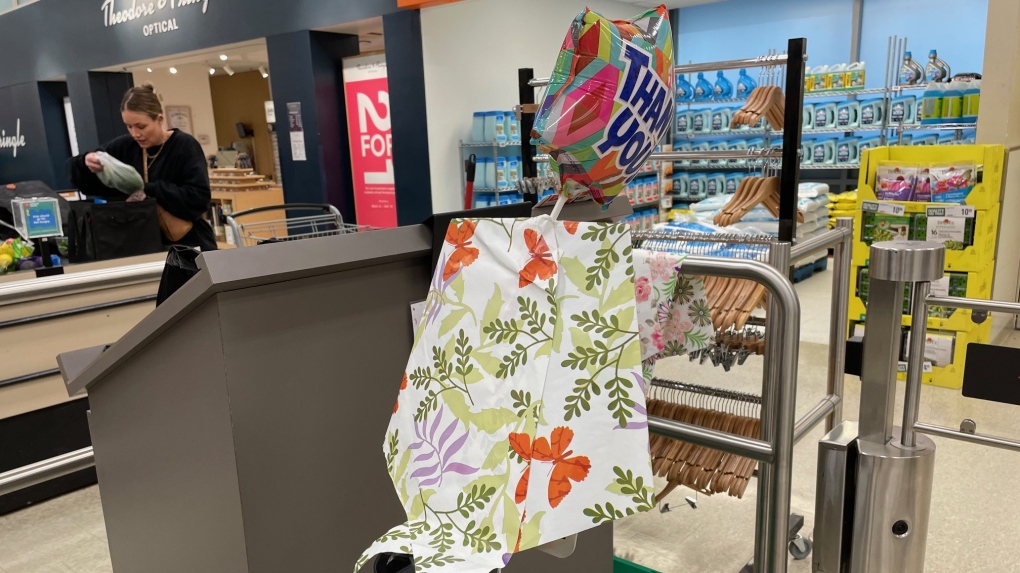Loblaw under fire for testing self-checkout receipt scanners at 4 Ontario locations
Loblaw is facing criticism after installing receipt scanners in four of its southern Ontario stores this week as part of a pilot project.
The devices are positioned at the exit of the self-checkout section at the four locations. Shoppers scan their receipt in order to open a gate to exit the store.
If someone opens the gate without scanning their receipt, an alarm goes off.
Loblaw said the machines are being tested as part of a pilot project aimed at combatting “organized retail crime.” The scanners are located in stores in Woodstock, Windsor, Oakville, and Georgetown.
Shoppers that CTV News Kitchener spoke to on Thursday said they didn’t like the idea.
“If you’re worried about theft, start hiring more people to have at your checkout counters and then you won’t have to have self-checkout,” said Dan Herreman, speaking outside the Woodstock Zehrs where one of the machines is located.
The device at the Zehrs location was covered in wrapping paper and not in operation on Thursday.
In an email Loblaw said the machines are sometimes temporarily turned off "allowing us to adjust the equipment and the processes as we learn."
 A receipt scanner is seen covered in wrapping paper inside a Zehrs in Woodstock, Ont. on March 14, 2024. (Tyler Kelaher/CTV Kitchener)
A receipt scanner is seen covered in wrapping paper inside a Zehrs in Woodstock, Ont. on March 14, 2024. (Tyler Kelaher/CTV Kitchener)
Another Woodstock shopper, Susan Aube, said she usually tries to avoid the self-checkout.
“I feel like they don’t trust their customers if they have to check their receipts after they pay,” Aube said. “I think they need more cashiers.”
In a statement to CTV News, Loblaw said: “Organized retail crime across the entire industry is a very serious issue, and has only gotten worse.”
It did not provide statistics to support the claim.
“To protect customers and colleagues, we’re always looking at different ways to stop this theft,” Loblaw continued. “This pilot is a part of these efforts. It’s a small trial in four stores in southern Ontario to determine effectiveness. We are working hard to balance a need for enhanced security while at the same time preserving a welcoming and convenient customer experience. We welcome our customers’ input and as always, appreciate their understanding.”
'The timing couldn’t have been worse'
Brad Davis, a marketing professor at Wilfrid Laurier University in Waterloo, Ont., says people already feel like big grocers “gouge” shoppers with high costs and shrinkflation, so the pilot project is not being received well.
“The timing couldn’t have been worse for Loblaw,” Davis said.
A typical grocery store is losing between $3,000 and $4,000 a week in terms of theft, Davis added.
According to him, the decision to introduce more security is more about saving money rather than keeping customers happy.
“You have the operations people saying if we put security measures in, ‘here’s the hardline cost savings’ and the marketing people going ‘yeah, but you’re really going to tick off consumers,’” Davis explained.
Ultimately, he said it may not be enough to get people to shop somewhere else.
“It’s convenient, we know the place, it’s got all the brands we want,” Davis said. “I’m not sure we’re going to see very much in the way of customer attrition, just because habitual behaviour is so strong.”
CTVNews.ca Top Stories

BREAKING Real GDP per capita declines for 6th consecutive quarter, household savings rise
Statistics Canada says the economy grew at an annualized pace of one per cent during the third quarter, in line with economists' expectations.
W5 Investigates A 'ticking time bomb': Inside Syria's toughest prison holding accused high-ranking ISIS members
In the last of a three-part investigation, W5's Avery Haines was given rare access to a Syrian prison, where thousands of accused high-ranking ISIS members are being held.
Class-action lawsuit on 'opioid-related wrongs': Court to rule on drug companies' appeal
Canada's top court will rule Friday on the appeal of a class-action lawsuit meant to recoup some of the costs associated with British Columbia's opioid crisis from major drug makers and distributors.
As Australia bans social media for children, Quebec is paying close attention
As Australia moves to ban social media for children under 16, Quebec is debating whether to follow suit.
Irregular sleep patterns may raise risk of heart attack and stroke, study suggests
Sleeping and waking up at different times is associated with an increased risk of heart attack and stroke, even for people who get the recommended amount of sleep, according to new research.
California man who went missing for 25 years found after sister sees his picture in the news
It’s a Thanksgiving miracle for one California family after a man who went missing in 1999 was found 25 years later when his sister saw a photo of him in an online article, authorities said.
Trudeau Liberals' two-month GST holiday bill passes the House, off to the Senate
The federal government's five-page piece of legislation to enact Prime Minister Justin Trudeau's promised two-month tax break on a range of consumer goods over the holidays passed in the House of Commons late Thursday.
Nick Cannon says he's seeking help for narcissistic personality disorder
Nick Cannon has spoken out about his recent diagnosis of narcissistic personality disorder, saying 'I need help.'
Notre Dame Cathedral: Sneak peek ahead of the reopening
After more than five years of frenetic reconstruction work, Notre Dame Cathedral showed its new self to the world Friday, with rebuilt soaring ceilings and creamy good-as-new stonework erasing somber memories of its devastating fire in 2019.

































